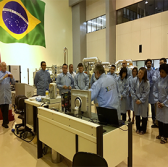 NASA will collaborate with a team of space researchers in Brazil to conduct a joint CubeSat mission as part of efforts to study phenomena that occur within the Earth’s upper atmosphere.
NASA will collaborate with a team of space researchers in Brazil to conduct a joint CubeSat mission as part of efforts to study phenomena that occur within the Earth’s upper atmosphere.
The Scintillation Prediction Observations Research Task mission aims to observe the equatorial plasma bubbles and scintillation in the ionosphere that affect radio communications, satellite technologies and global positioning systems, NASA said Friday.
SPORT will be designed and launched as a CubeSat in a push to monitor changes in the ionosphere, study the causes, predict and mitigate the effects of the phenomena.
NASA added the mission supports the space agency’s Heliophysics Technology and Instrument Development for Science program.
Jim Spann, chief scientist for the science and technology directorate at NASA’s Marshall Space Flight Center, said that the SPORT mission will look to understand the phenomena and develop operational systems that can help address disrupted communications and GPS challenges.
“SPORT will make a systematic study of the ionosphere at all longitudes around the planet, documenting the conditions that trigger formation of the bubbles, with particular focus on the South American sector,” said Spann.
Spann will serve as the principal investigator for the NASAÂ Science Mission Directorate-funded mission currently slated for launch in 2019.
The Brazilian SPORT team will look to develop targeted systems that can mitigate the negative effects of the space phenomenon called the South Atlantic Anomaly which impacts the takeoff and landing at Brazil’s airports.
Otavio Durao, project manager for the team at Instituto Nacional de Pesquisas Espaciais, also said that Brazil seeks to address the effects of the anomaly on the country’s agricultural industry and crop productivity.
Brazil’s space agency and national institute for space research and technical aeronautics institute will also work with researchers from NASA’s Goddard Space Flight Center, Utah State University, University of Texas at Dallas, University of Alabama and other international partners on the SPORT mission.




